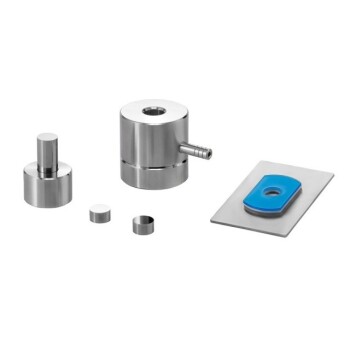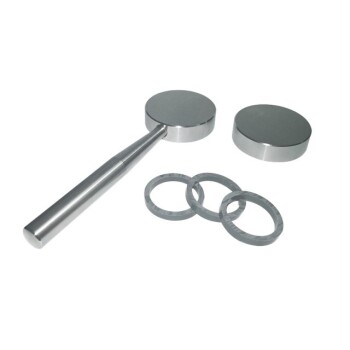At its core, the significance of a hydraulic press lies in its unique ability to amplify a small, manageable force into an immense, highly controllable pressure. This principle allows these machines to become indispensable tools for both shaping materials on an industrial scale and preparing precise samples for detailed laboratory analysis.
The fundamental challenge in many industrial and scientific fields is the need to apply massive force with extreme precision. The hydraulic press solves this elegantly by using an incompressible fluid to multiply force, making it a cornerstone for everything from manufacturing car parts to enabling breakthroughs in material science.

The Core Principle: Force Multiplication
A hydraulic press operates on a simple yet powerful concept known as Pascal's Law. Understanding this is key to grasping its importance.
Pascal's Law in Action
This principle states that pressure applied to an enclosed, incompressible fluid is transmitted equally throughout the fluid. A hydraulic press uses two connected cylinders of different sizes.
A small force applied to a small piston creates pressure in the hydraulic fluid. This same pressure then acts on a much larger piston, generating a proportionally larger output force. This is how a simple hand pump can generate tons of force.
The Source of Its Power
The system's ability to multiply force is directly related to the ratio of the pistons' surface areas. This simple mechanical advantage is what allows a compact machine to perform work that would otherwise require a much larger and more complex mechanical system.
The Press in Industrial Manufacturing
In industrial settings, the goal is typically efficiency, repeatability, and the power to shape durable materials. The hydraulic press excels in these areas.
Forming and Shaping
Hydraulic presses are workhorses for metal forming, including stamping, forging, and molding. The slow, even pressure they apply is ideal for deep-drawing operations, where a sheet of metal is shaped into a complex part without tearing or wrinkling.
Compacting and Assembling
These presses are also used to compact powders into solid forms, such as in the pharmaceutical or ceramics industries. They also provide the immense, controlled force needed to press-fit bearings or assemble tight-tolerance components.
The Role of Controlled Heat
Hydraulic hot presses add a heated platen to the system. This combination of intense pressure and controlled temperature is critical for molding composite materials, curing laminates, and performing other advanced manufacturing processes.
The Press in the Laboratory
In a laboratory, the focus shifts from mass production to precision, analysis, and research. The press is not making a final product, but preparing a material for study.
Precise Sample Preparation
For analytical techniques like FTIR (infrared spectroscopy) or XRF (X-ray fluorescence), the sample must be prepared perfectly to get accurate data. A lab press creates thin, uniform, and homogenous pellets (like KBr pellets) from powder samples.
This consistency ensures that the analytical instrument can pass a beam through the sample evenly, eliminating variables that could distort the results and leading to highly repeatable measurements.
Material Strength Testing
Researchers use hydraulic presses to determine the compressive strength and durability of a material. By applying a measured, increasing force until the sample deforms or fails, engineers can verify the quality of a new alloy or a concrete mixture.
Prototyping and Research
The controlled force of a lab press is ideal for prototyping microfluidic devices or investigating how different materials behave under extreme pressure. This capability is crucial for advancing material science and developing innovative new products.
Understanding the Key Advantages
The widespread use of hydraulic presses stems from a clear set of advantages over other types of presses, such as mechanical or pneumatic systems.
Precision and Control
The defining feature of a hydraulic press is its total control over the applied force. The pressure can be adjusted precisely, held for any length of time, and released smoothly. This is difficult to achieve with mechanical presses, which are often tied to the rotation of a flywheel.
High Force in a Compact Design
Hydraulics allow for the generation of extremely high forces from a relatively small machine footprint. This high power density makes them efficient and saves valuable floor space in both factories and labs.
Durability and Low Maintenance
With fewer moving parts compared to mechanical presses, hydraulic systems are generally very durable and require less maintenance. The hydraulic fluid itself acts as a lubricant for the system's components.
Making the Right Choice for Your Goal
The "best" press is entirely dependent on the task at hand. Your application dictates the necessary features.
- If your primary focus is high-volume industrial manufacturing: You need a robust, often automated press where cycle speed, tonnage, and durability are the most critical factors.
- If your primary focus is laboratory sample preparation (FTIR/XRF): You need a smaller manual or automatic press where precision, ease of use, and sample repeatability are paramount.
- If your primary focus is materials science research: You need a highly adaptable press, often with options for heating and precise data logging to test the absolute limits of novel materials.
Ultimately, the hydraulic press is a powerful tool for manipulation, enabling us to shape our world on a macro scale and understand it on a micro scale.
Summary Table:
| Aspect | Industrial Significance | Laboratory Significance |
|---|---|---|
| Primary Use | Metal forming, compacting, assembly | Sample preparation (e.g., FTIR/XRF pellets), material testing |
| Key Features | High force, efficiency, durability | Precision control, repeatability, adaptability |
| Benefits | Cost-effective mass production, space-saving | Accurate data analysis, research advancements |
Ready to enhance your operations with reliable hydraulic presses? KINTEK specializes in lab press machines, including automatic lab presses, isostatic presses, and heated lab presses, designed to meet the precise needs of laboratories. Whether you're preparing samples for analysis or advancing material science research, our equipment delivers superior control, durability, and efficiency. Contact us today to discuss how we can support your specific requirements and drive your success!
Visual Guide

Related Products
- Laboratory Hydraulic Press 2T Lab Pellet Press for KBR FTIR
- Laboratory Hydraulic Press Lab Pellet Press Button Battery Press
- Manual Heated Hydraulic Lab Press with Integrated Hot Plates Hydraulic Press Machine
- Automatic Laboratory Hydraulic Press for XRF and KBR Pellet Pressing
- Manual Laboratory Hydraulic Press Lab Pellet Press
People Also Ask
- How are hydraulic presses used in spectroscopy and compositional determination? Enhance Accuracy in FTIR and XRF Analysis
- What is the role of a hydraulic press in KBr pellet preparation for FTIR? Achieve High-Resolution Chemical Insights
- Why is sample uniformity critical when using a laboratory hydraulic press for humic acid KBr pellets? Achieve FTIR Accuracy
- What role does a laboratory hydraulic press play in carbonate powder prep? Optimize Your Sample Analysis
- How is a laboratory hydraulic press used for Tb(III)-Organic Framework FT-IR samples? Expert Pellet Pressing Guide



















